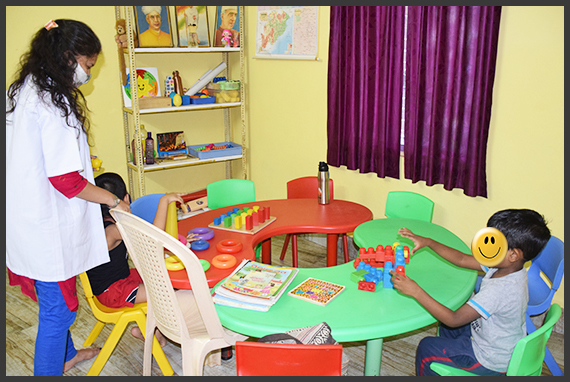It is common for a child with Intellectual Disability faces problems with speaking, reading, eating, taking care of himself, or interacting with others appropriately. Earlier, the term "mental retardation" was used but we no longer use that term. Typically, these children have delay in the development in the early childhood that includes ability to sit, crawl, walk and speak. As such there is overall delay in developmental milestones.
Intellectual disability is a life-long condition. However, early and ongoing intervention for Treatment Mental Retardation may improve functioning and enable the person to thrive throughout their lifetime.
Genetic conditions like Down syndrome, phenylketonuria, or fragile X syndrome.
Congenital anomalies or brain malformations like microcephaly.
Infections like meningitis, measles.
exposure to toxins such as mercury or lead.
Serious head injury.
Rubela of mother or infection during pregnancy.
Insufficient oxygenation at birth and extreme malnutrition.
Pregnancy and birth are not provided with adequate medical care.

Delayed developmental milestones - such as sitting up, crawling, walking, or talking compared to the normal children.
Delay and difficulty in speaking and using language.
Understanding social rules or cues, difficulty in socialising or letting others know their needs and regulating their emotions and behaviours.
They have difficulty in understanding the results of their actions or consequences.
Problem solving, logical thinking, judgment and decision-making skills are affected.
Planning or following routines even in daily activities is challenging.
Can have difficulty in remembering things, or using a system.
Have limited ability to perform basic personal care tasks, such as eating, getting dressed, or completing household chores.
Finds difficult to learn from own experiences.
Communication using facial expressions and gestures.
Symptoms of intellectual disability are evident in early childhood. It is especially common for children under 2 years of age in particular, difficulty with language and motor skills may occur.
An IQ test by a Psychologist is performed to have the diagnosis of ID. A score of 70 - 75 or less may indicate intellectual disability. Interviews with the individual and family to assess adaptive functioning, conceptual, social, and practical functioning and whether has the skills necessary to live independently.
General medical and Neurological Assessment is essential to know the systemic malfunction, structural anomalies, genetic defects etc. that influences the outcome of the rehabilitation.
special education assessment to understand the challenges in learning.
Hearing, speech, and vision is tested to understand the need for professional intervention for the Treatment for Intellectual Disabilities.
Evaluations by Physiotherapist are done to know if problems with motor skills, musculoskeletal anomalies coexist with ID.
Early interventions that work to identify intellectual disability in infants and toddlers and make assessment by professional.
Special education with individualise education plans which are available to every child with intellectual disability.
Day care programs at the campus with personalised care giving.
Housing options for the parents and children to stay close to the campus of the organisation.
Psychological intervention or Behaviour modification to improve their executive functions for Treatment Mental Retardation.
Speech and Language therapy for development of communication skills.
Audiological rehabilitation to deal with hearing issues or auditory processing disorders.
Recreational therapy to improve their fine-motor skills like eye-hand coordination.
Rehabilitation counselling for family members and care provider.
Adapted Aids or assistive devices as and when required.
vocational programs, such as skill learning for the older children.
Biomedical intervention to augment rehabilitation measures and deal with comorbid conditions for the Treatment for Intellectual Disabilities.

Family members, caregivers, friends, co-workers, and community members are guided to support to people with intellectual disability. With proper support and comprehensive treatment, most children with intellectual disability are capable of achieving successful integration in the community by the proper Treatment for Intellectual Disabilities. It is possible for people with intellectual disabilities to attend the normal schools however, how well someone is able to cope and function with intellectual disability is also dependent on the severity of the condition and underlying genetic or medical conditions they have.
Have Any Questions!! Call Us